Creating a Leadership Philosophy Based on Path-Goal Theory
VerifiedAdded on 2023/06/03
|6
|1204
|218
Essay
AI Summary
This essay explores the development of a personal leadership philosophy based on the Path-Goal leadership theory. The author discusses the core principles of Path-Goal theory, emphasizing the leader's role in creating clear paths for subordinates to achieve organizational goals. The essay outlines the author's leadership philosophy, built on service, purpose, strategy, trust, unity, and integrity, with a strong emphasis on honesty, credibility, quality, and knowledge sharing. The preferred leadership style is identified as relationship-motivated leadership, focusing on teamwork, conflict resolution, and inclusivity. The essay concludes by detailing how this philosophy would be applied in an educational leadership setting, including understanding the audience, identifying effective leadership skills, defining the leader's role, and addressing issues affecting the community.
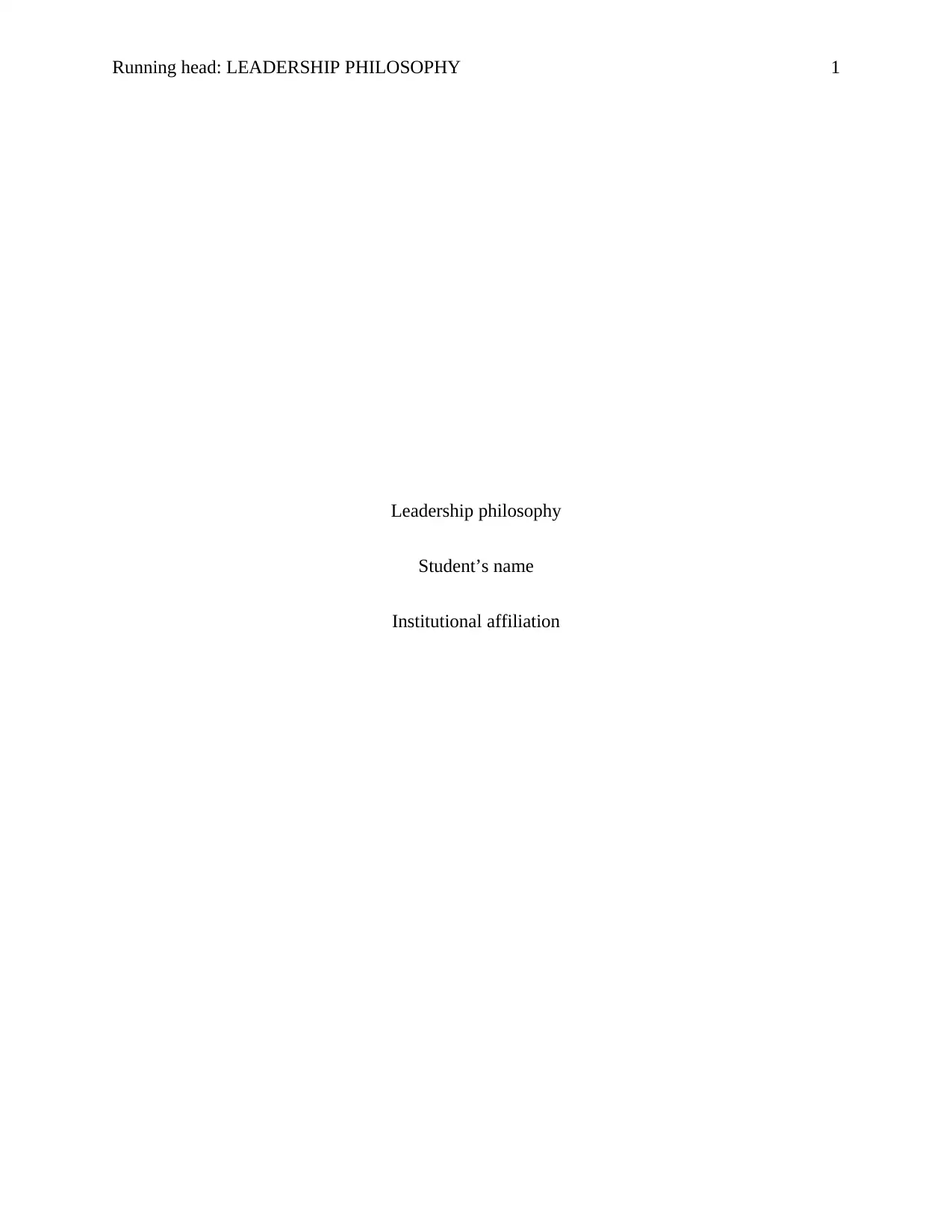
Running head: LEADERSHIP PHILOSOPHY 1
Leadership philosophy
Student’s name
Institutional affiliation
Leadership philosophy
Student’s name
Institutional affiliation
Paraphrase This Document
Need a fresh take? Get an instant paraphrase of this document with our AI Paraphraser
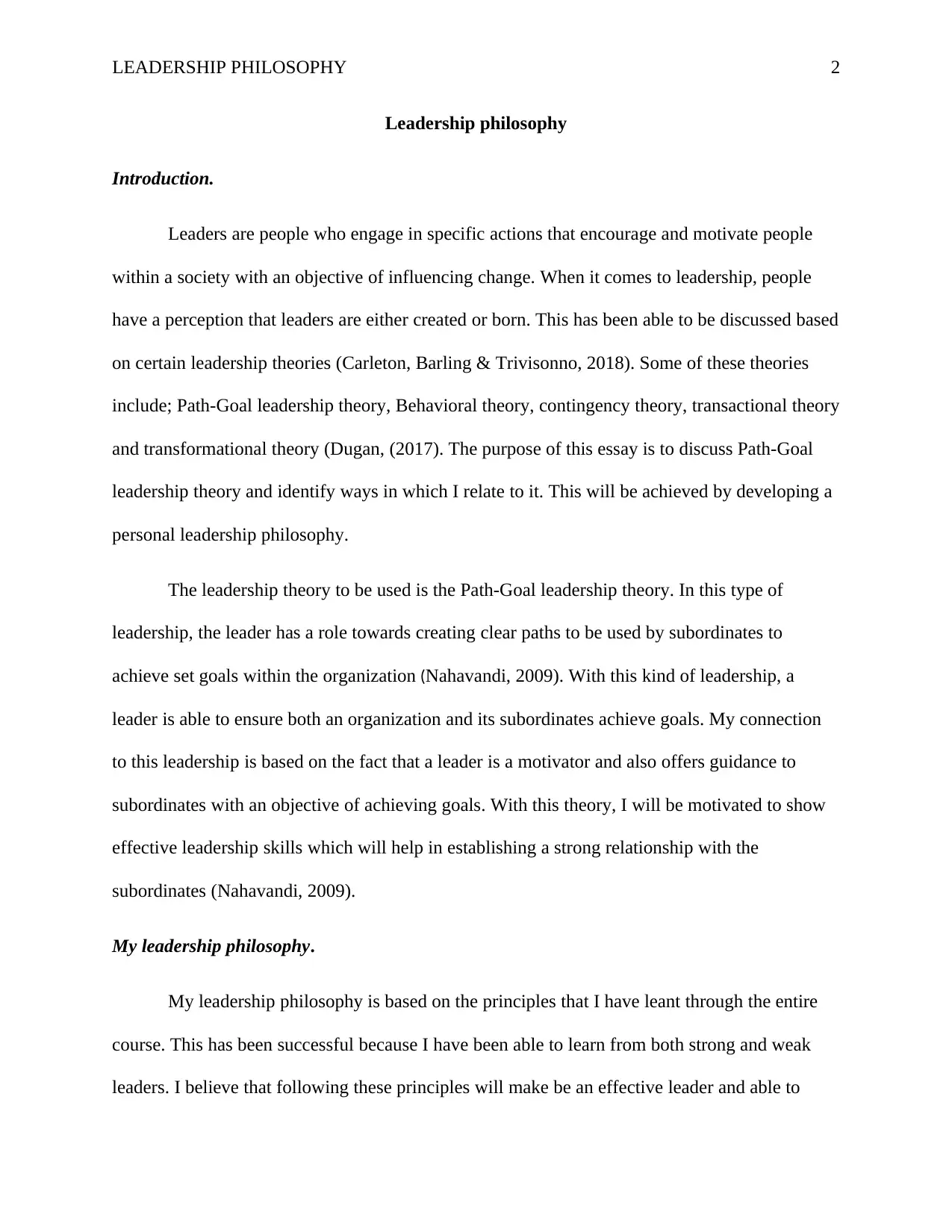
LEADERSHIP PHILOSOPHY 2
Leadership philosophy
Introduction.
Leaders are people who engage in specific actions that encourage and motivate people
within a society with an objective of influencing change. When it comes to leadership, people
have a perception that leaders are either created or born. This has been able to be discussed based
on certain leadership theories (Carleton, Barling & Trivisonno, 2018). Some of these theories
include; Path-Goal leadership theory, Behavioral theory, contingency theory, transactional theory
and transformational theory (Dugan, (2017). The purpose of this essay is to discuss Path-Goal
leadership theory and identify ways in which I relate to it. This will be achieved by developing a
personal leadership philosophy.
The leadership theory to be used is the Path-Goal leadership theory. In this type of
leadership, the leader has a role towards creating clear paths to be used by subordinates to
achieve set goals within the organization (Nahavandi, 2009). With this kind of leadership, a
leader is able to ensure both an organization and its subordinates achieve goals. My connection
to this leadership is based on the fact that a leader is a motivator and also offers guidance to
subordinates with an objective of achieving goals. With this theory, I will be motivated to show
effective leadership skills which will help in establishing a strong relationship with the
subordinates (Nahavandi, 2009).
My leadership philosophy.
My leadership philosophy is based on the principles that I have leant through the entire
course. This has been successful because I have been able to learn from both strong and weak
leaders. I believe that following these principles will make be an effective leader and able to
Leadership philosophy
Introduction.
Leaders are people who engage in specific actions that encourage and motivate people
within a society with an objective of influencing change. When it comes to leadership, people
have a perception that leaders are either created or born. This has been able to be discussed based
on certain leadership theories (Carleton, Barling & Trivisonno, 2018). Some of these theories
include; Path-Goal leadership theory, Behavioral theory, contingency theory, transactional theory
and transformational theory (Dugan, (2017). The purpose of this essay is to discuss Path-Goal
leadership theory and identify ways in which I relate to it. This will be achieved by developing a
personal leadership philosophy.
The leadership theory to be used is the Path-Goal leadership theory. In this type of
leadership, the leader has a role towards creating clear paths to be used by subordinates to
achieve set goals within the organization (Nahavandi, 2009). With this kind of leadership, a
leader is able to ensure both an organization and its subordinates achieve goals. My connection
to this leadership is based on the fact that a leader is a motivator and also offers guidance to
subordinates with an objective of achieving goals. With this theory, I will be motivated to show
effective leadership skills which will help in establishing a strong relationship with the
subordinates (Nahavandi, 2009).
My leadership philosophy.
My leadership philosophy is based on the principles that I have leant through the entire
course. This has been successful because I have been able to learn from both strong and weak
leaders. I believe that following these principles will make be an effective leader and able to
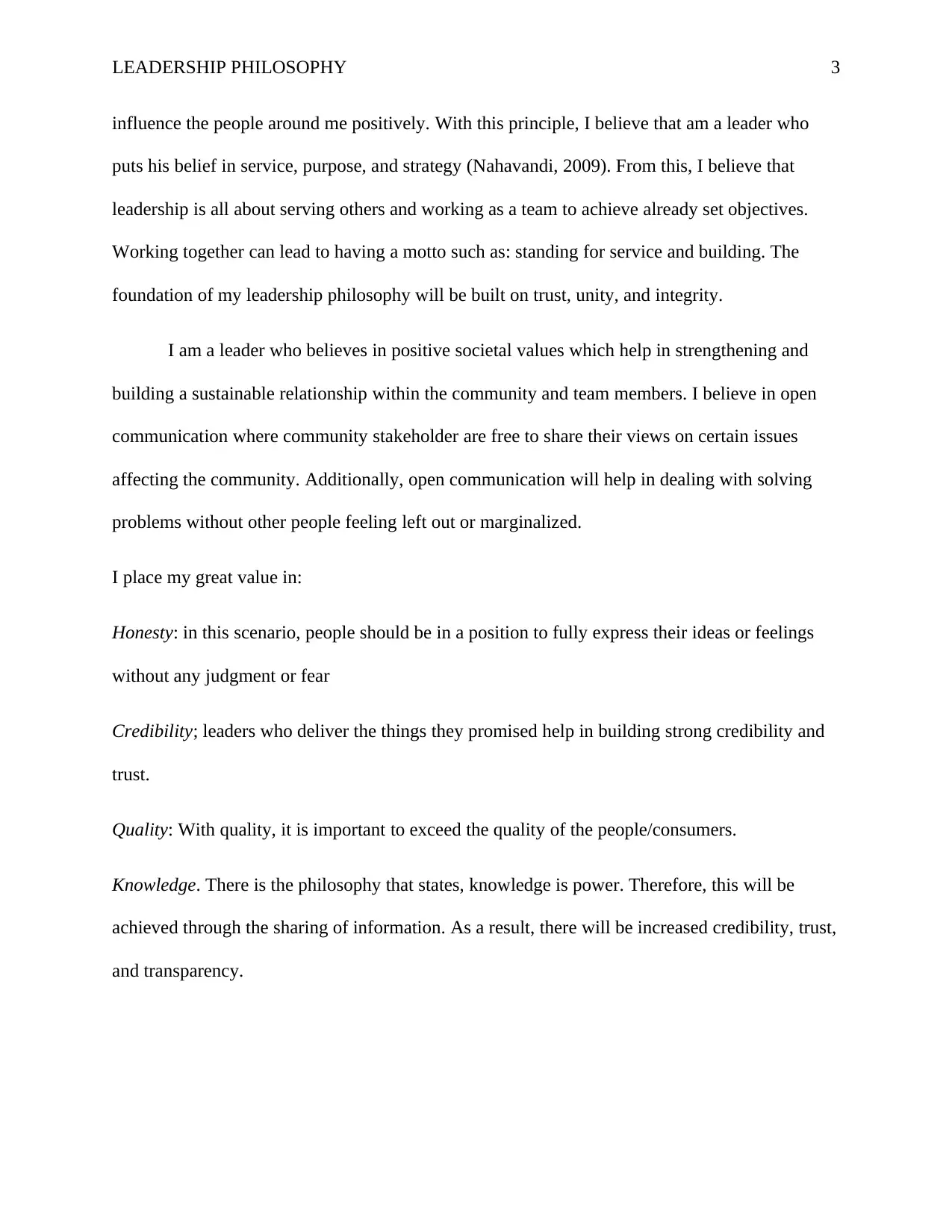
LEADERSHIP PHILOSOPHY 3
influence the people around me positively. With this principle, I believe that am a leader who
puts his belief in service, purpose, and strategy (Nahavandi, 2009). From this, I believe that
leadership is all about serving others and working as a team to achieve already set objectives.
Working together can lead to having a motto such as: standing for service and building. The
foundation of my leadership philosophy will be built on trust, unity, and integrity.
I am a leader who believes in positive societal values which help in strengthening and
building a sustainable relationship within the community and team members. I believe in open
communication where community stakeholder are free to share their views on certain issues
affecting the community. Additionally, open communication will help in dealing with solving
problems without other people feeling left out or marginalized.
I place my great value in:
Honesty: in this scenario, people should be in a position to fully express their ideas or feelings
without any judgment or fear
Credibility; leaders who deliver the things they promised help in building strong credibility and
trust.
Quality: With quality, it is important to exceed the quality of the people/consumers.
Knowledge. There is the philosophy that states, knowledge is power. Therefore, this will be
achieved through the sharing of information. As a result, there will be increased credibility, trust,
and transparency.
influence the people around me positively. With this principle, I believe that am a leader who
puts his belief in service, purpose, and strategy (Nahavandi, 2009). From this, I believe that
leadership is all about serving others and working as a team to achieve already set objectives.
Working together can lead to having a motto such as: standing for service and building. The
foundation of my leadership philosophy will be built on trust, unity, and integrity.
I am a leader who believes in positive societal values which help in strengthening and
building a sustainable relationship within the community and team members. I believe in open
communication where community stakeholder are free to share their views on certain issues
affecting the community. Additionally, open communication will help in dealing with solving
problems without other people feeling left out or marginalized.
I place my great value in:
Honesty: in this scenario, people should be in a position to fully express their ideas or feelings
without any judgment or fear
Credibility; leaders who deliver the things they promised help in building strong credibility and
trust.
Quality: With quality, it is important to exceed the quality of the people/consumers.
Knowledge. There is the philosophy that states, knowledge is power. Therefore, this will be
achieved through the sharing of information. As a result, there will be increased credibility, trust,
and transparency.
⊘ This is a preview!⊘
Do you want full access?
Subscribe today to unlock all pages.

Trusted by 1+ million students worldwide
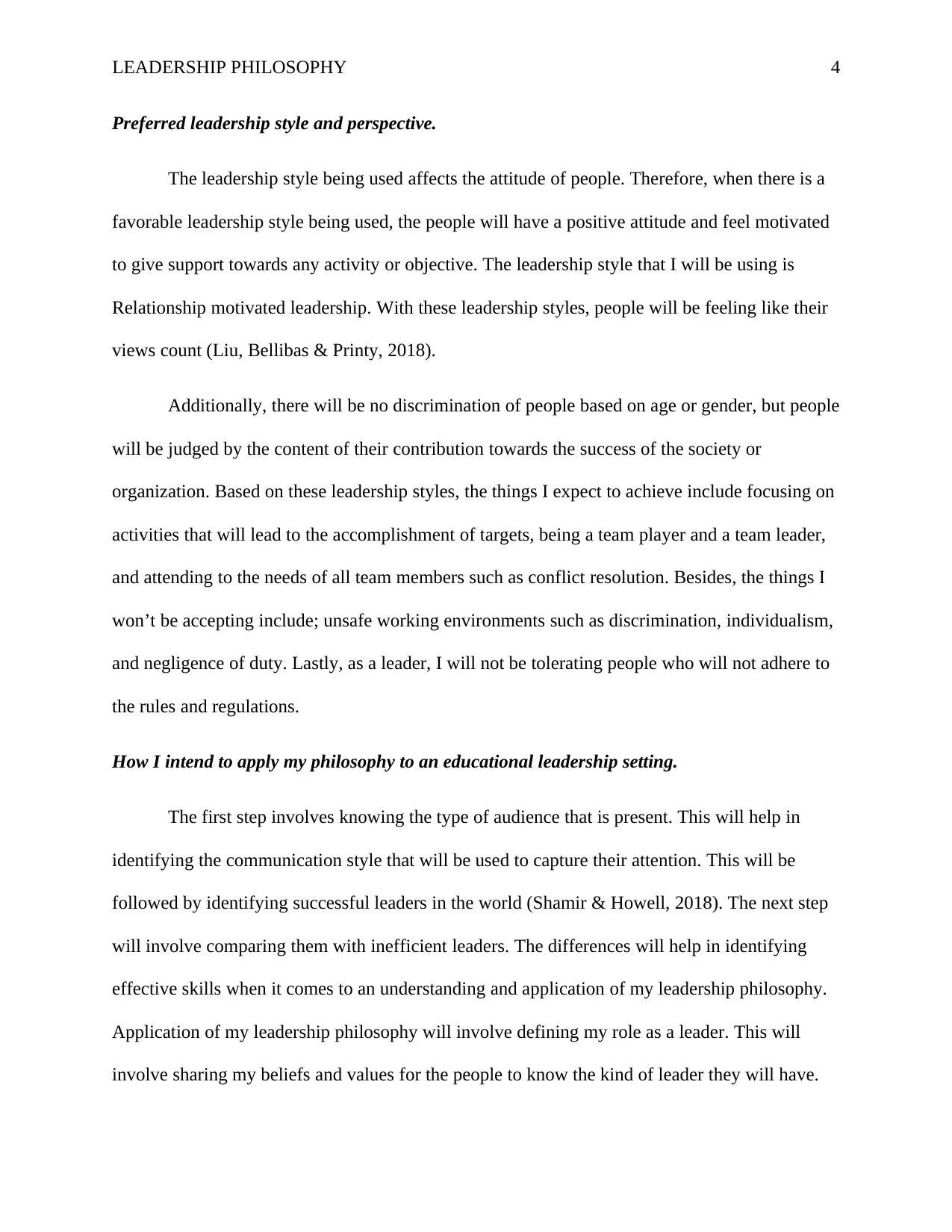
LEADERSHIP PHILOSOPHY 4
Preferred leadership style and perspective.
The leadership style being used affects the attitude of people. Therefore, when there is a
favorable leadership style being used, the people will have a positive attitude and feel motivated
to give support towards any activity or objective. The leadership style that I will be using is
Relationship motivated leadership. With these leadership styles, people will be feeling like their
views count (Liu, Bellibas & Printy, 2018).
Additionally, there will be no discrimination of people based on age or gender, but people
will be judged by the content of their contribution towards the success of the society or
organization. Based on these leadership styles, the things I expect to achieve include focusing on
activities that will lead to the accomplishment of targets, being a team player and a team leader,
and attending to the needs of all team members such as conflict resolution. Besides, the things I
won’t be accepting include; unsafe working environments such as discrimination, individualism,
and negligence of duty. Lastly, as a leader, I will not be tolerating people who will not adhere to
the rules and regulations.
How I intend to apply my philosophy to an educational leadership setting.
The first step involves knowing the type of audience that is present. This will help in
identifying the communication style that will be used to capture their attention. This will be
followed by identifying successful leaders in the world (Shamir & Howell, 2018). The next step
will involve comparing them with inefficient leaders. The differences will help in identifying
effective skills when it comes to an understanding and application of my leadership philosophy.
Application of my leadership philosophy will involve defining my role as a leader. This will
involve sharing my beliefs and values for the people to know the kind of leader they will have.
Preferred leadership style and perspective.
The leadership style being used affects the attitude of people. Therefore, when there is a
favorable leadership style being used, the people will have a positive attitude and feel motivated
to give support towards any activity or objective. The leadership style that I will be using is
Relationship motivated leadership. With these leadership styles, people will be feeling like their
views count (Liu, Bellibas & Printy, 2018).
Additionally, there will be no discrimination of people based on age or gender, but people
will be judged by the content of their contribution towards the success of the society or
organization. Based on these leadership styles, the things I expect to achieve include focusing on
activities that will lead to the accomplishment of targets, being a team player and a team leader,
and attending to the needs of all team members such as conflict resolution. Besides, the things I
won’t be accepting include; unsafe working environments such as discrimination, individualism,
and negligence of duty. Lastly, as a leader, I will not be tolerating people who will not adhere to
the rules and regulations.
How I intend to apply my philosophy to an educational leadership setting.
The first step involves knowing the type of audience that is present. This will help in
identifying the communication style that will be used to capture their attention. This will be
followed by identifying successful leaders in the world (Shamir & Howell, 2018). The next step
will involve comparing them with inefficient leaders. The differences will help in identifying
effective skills when it comes to an understanding and application of my leadership philosophy.
Application of my leadership philosophy will involve defining my role as a leader. This will
involve sharing my beliefs and values for the people to know the kind of leader they will have.
Paraphrase This Document
Need a fresh take? Get an instant paraphrase of this document with our AI Paraphraser
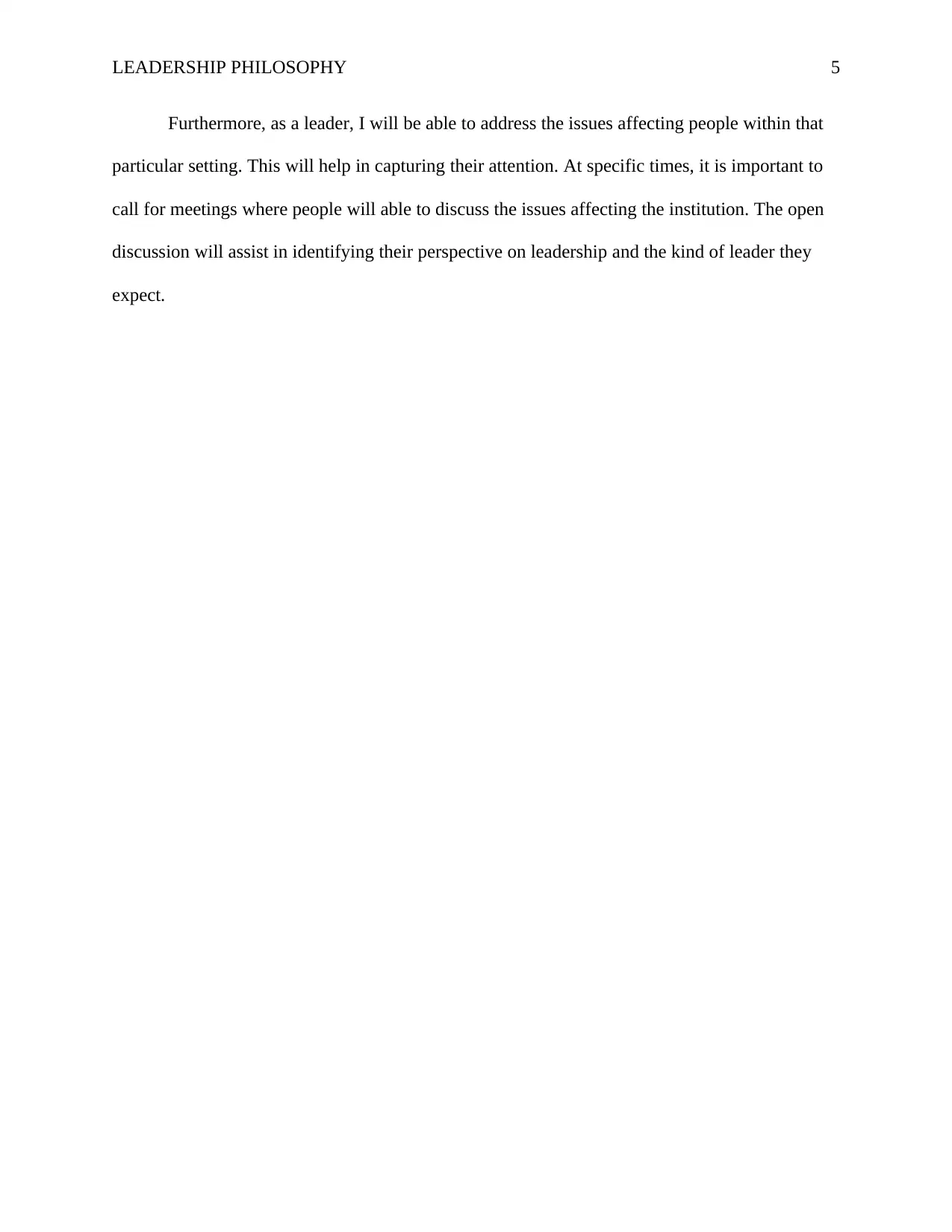
LEADERSHIP PHILOSOPHY 5
Furthermore, as a leader, I will be able to address the issues affecting people within that
particular setting. This will help in capturing their attention. At specific times, it is important to
call for meetings where people will able to discuss the issues affecting the institution. The open
discussion will assist in identifying their perspective on leadership and the kind of leader they
expect.
Furthermore, as a leader, I will be able to address the issues affecting people within that
particular setting. This will help in capturing their attention. At specific times, it is important to
call for meetings where people will able to discuss the issues affecting the institution. The open
discussion will assist in identifying their perspective on leadership and the kind of leader they
expect.
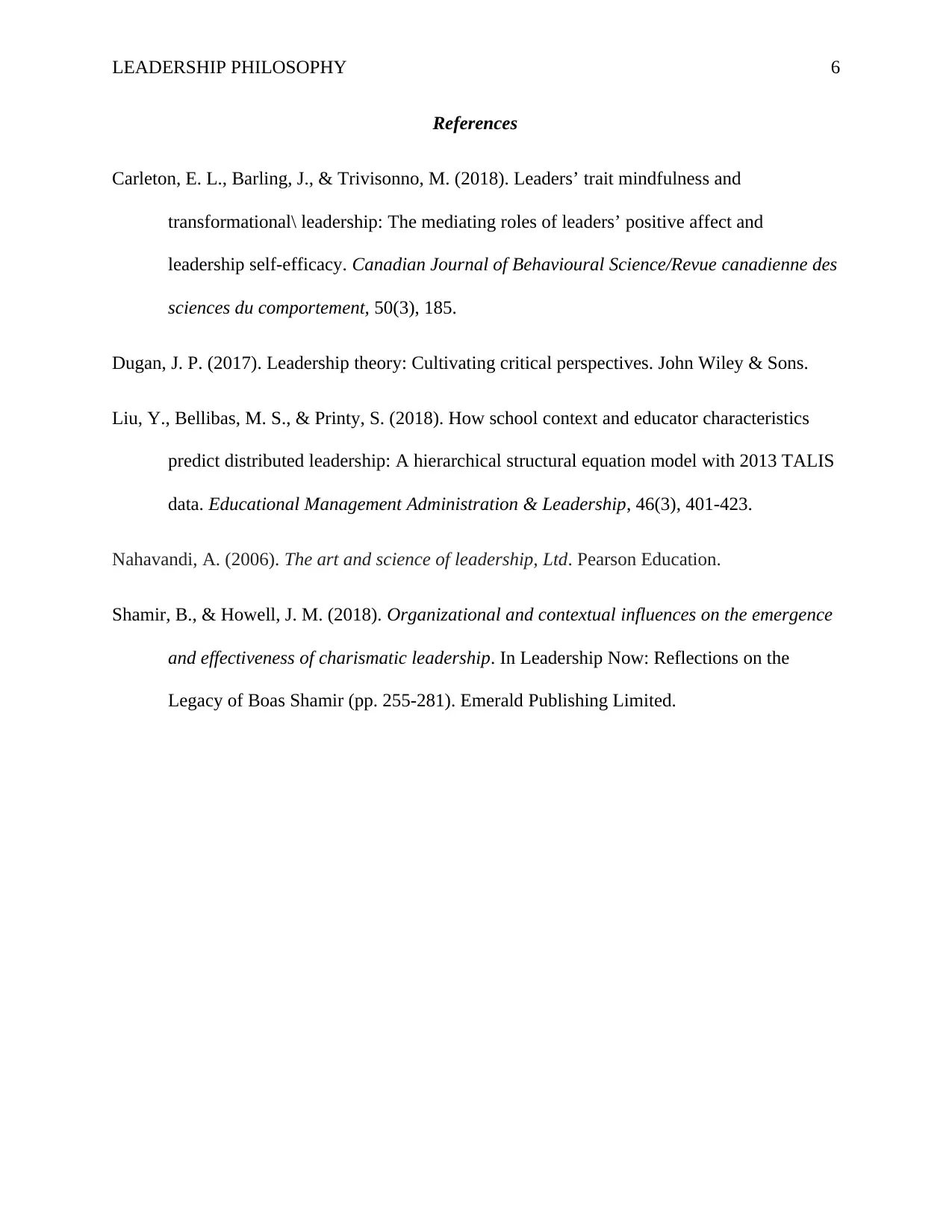
LEADERSHIP PHILOSOPHY 6
References
Carleton, E. L., Barling, J., & Trivisonno, M. (2018). Leaders’ trait mindfulness and
transformational\ leadership: The mediating roles of leaders’ positive affect and
leadership self-efficacy. Canadian Journal of Behavioural Science/Revue canadienne des
sciences du comportement, 50(3), 185.
Dugan, J. P. (2017). Leadership theory: Cultivating critical perspectives. John Wiley & Sons.
Liu, Y., Bellibas, M. S., & Printy, S. (2018). How school context and educator characteristics
predict distributed leadership: A hierarchical structural equation model with 2013 TALIS
data. Educational Management Administration & Leadership, 46(3), 401-423.
Nahavandi, A. (2006). The art and science of leadership, Ltd. Pearson Education.
Shamir, B., & Howell, J. M. (2018). Organizational and contextual influences on the emergence
and effectiveness of charismatic leadership. In Leadership Now: Reflections on the
Legacy of Boas Shamir (pp. 255-281). Emerald Publishing Limited.
References
Carleton, E. L., Barling, J., & Trivisonno, M. (2018). Leaders’ trait mindfulness and
transformational\ leadership: The mediating roles of leaders’ positive affect and
leadership self-efficacy. Canadian Journal of Behavioural Science/Revue canadienne des
sciences du comportement, 50(3), 185.
Dugan, J. P. (2017). Leadership theory: Cultivating critical perspectives. John Wiley & Sons.
Liu, Y., Bellibas, M. S., & Printy, S. (2018). How school context and educator characteristics
predict distributed leadership: A hierarchical structural equation model with 2013 TALIS
data. Educational Management Administration & Leadership, 46(3), 401-423.
Nahavandi, A. (2006). The art and science of leadership, Ltd. Pearson Education.
Shamir, B., & Howell, J. M. (2018). Organizational and contextual influences on the emergence
and effectiveness of charismatic leadership. In Leadership Now: Reflections on the
Legacy of Boas Shamir (pp. 255-281). Emerald Publishing Limited.
⊘ This is a preview!⊘
Do you want full access?
Subscribe today to unlock all pages.

Trusted by 1+ million students worldwide
1 out of 6
Related Documents
Your All-in-One AI-Powered Toolkit for Academic Success.
+13062052269
info@desklib.com
Available 24*7 on WhatsApp / Email
![[object Object]](/_next/static/media/star-bottom.7253800d.svg)
Unlock your academic potential
Copyright © 2020–2026 A2Z Services. All Rights Reserved. Developed and managed by ZUCOL.





